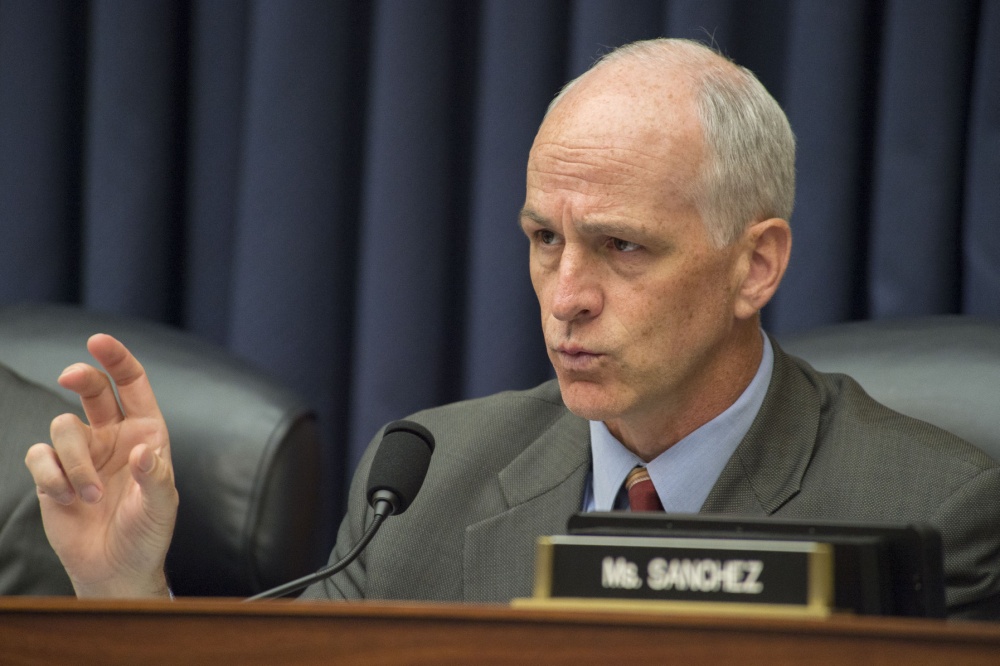
Rep. Adam Smith (D-Wash.), ranking member of the House Armed Services Committee, said the repeated use of continuing resolutions "is the worst" thing Congress does "for national security." DOD photo by Mass Communication Specialist 1st Class Daniel Hinton.
The top Democrat on the House Armed Services Committee said Thursday the consistent use of continuing resolutions is a “terrible way” to run the government—especially the military—even as Washington barrels toward another self-imposed deadline that this time might result in a short-term shutdown.
The current continuing resolution, passed in September, lasts until Dec. 8 and every proposed method to keep the government funded beyond that is “politically impossible and nobody wants to vote for it,” said Rep. Adam Smith (D-Wash.). Congress is running toward that “brick wall,” and Smith said he expects a shutdown before Congress decides that, “shit, that’s not popular either. What do we do? What do we do? What do we do?”
Smith said, “Of all the things we do,” continuing resolutions are “the worst for national security.”
Pentagon leadership, both under the current and previous administration, have blasted Capitol Hill for being unable to pass a long-term budget and give the Defense Department stable funding. Defense Secretary Jim Mattis, speaking at the Air Force Association’s Air, Space & Cyber Conference in September, said budget uncertainty isn’t just threatening military readiness, it is threatening the future of the country itself.
Congress, both under the current Republican control and under previous Democrat majorities, has formed an environment where appropriations bills are toxic and “no matter what appropriations bill is voted for, it will fail to meet public expectations,” Smith said.
“What is not disputable, is there is no scenario in which voting in favor of an appropriations process is a political positive,” Smith said. “That’s a problem.”
The discussion on moving forward an appropriations plan has not progressed “one inch” in the past nine months, he said.
With the current continuing resolution set to expire soon, military leaders are intensifying warnings of the consequences for military readiness if lawmakers cannot agree on a new budget.
“We are in the red,” said Maj. Gen. Scott Smith, the Air Force’s director of training and readiness, on Wednesday at the Interservice, Industry Training, Simulation, and Education conference in Orlando, Fla., UPI reported. “This doesn’t mean I can’t deploy a fighter squadron,” but “it’s hard to proceed” given the current budget uncertainty.
Also on Wednesday, the House received its quarterly readiness assessment from military service leaders. “The briefing further reinforced members’ concerns that the state of our military will continue to erode until Congress passes adequate and reliable resources,” said Rep. Joe Wilson (R-S.C.), who serves as chair of the House Armed Services readiness subcommittee, in a statement.
In addition to a potential government shutdown, sequestration is slated to return in 2018 and Air Force Secretary Heather Wilson said such broad and deep budget cuts, coupled with continuous budget instability through repeated continuing resolutions, would “break” the Air Force.
But as the government moves closer to a shutdown, politicians on both side are already trying to blame the other side instead of working toward a budget solution. From his perspective, lawmakers are avoiding budget decisions because of the public’s perception of government spending and how it is reflected in polling.
“It’s all bullshit, OK,” Smith said. “It’s well thought out, it’s well researched, it’s well polled bullshit. It works, if you can fake your way through it and make it sound sincere. But at the end of the day, the appetite in this country for government programs does not match our willingness to pay for them.”
